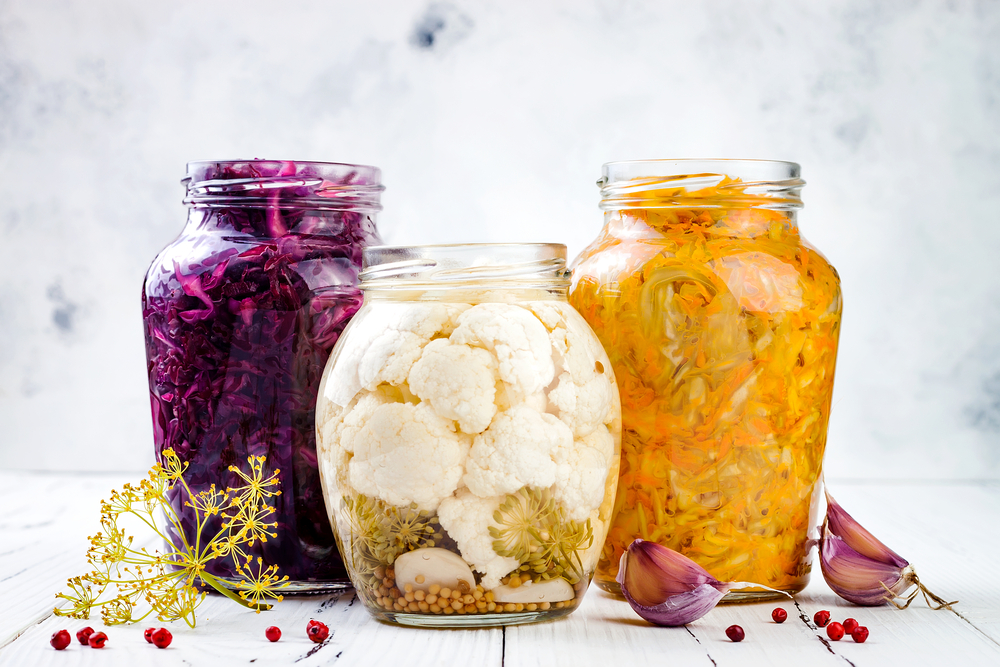
09 Jun Probiotic Foods to add to your Diet
In order to keep your bacteria levels in balance with diet alone, you have to commit to eating fermented and cultured foods every day. This is why it is a good idea to keep your gut healthy by keeping your lifestyle healthy as when your gut gets out of balance from stress and poor diet, it is even harder to get it back into balance. Unfortunately it can become a vicious cycle – you need good gut balance to keep your immune system strong but when this dips, the medicines may take further robs the body of good bacteria. This is why we do recommend taking a good probiotic alongside eating a diet rich in pre and probiotics.
FOODS THAT HAVE GOOD PROBIOTICS:
- Aged cheese
- Beer (microbrews)
- Cottage cheese (look for bacterial strains in ingredient list)
- Dark Chocolate
- Kefir
- Kimchi
- Kombucha Tea
- Micro-algae
- Miso
- Pickled ginger
- Pickles (brine-cured, without vinegar)
- Sauerkraut
- Shoyu
- Tamari
- Tempeh
- Tofu
- Wine
- Yoghurt
Some Notes:
- One of the best probiotic foods is live-cultured yoghurt, especially handmade. Look for brands made from goat’s milk that have been infused with extra forms of probiotics like lactobacillus or acidophilus. Goat’s milk and cheese are particularly high in probiotics like thermophillus, bifudus, bulgaricus and acidophilus. Be sure to read the ingredients list, as not all yogurt is made equally. Many popular brands are filled with high fructose corn syrup, artificial sweeteners and artificial flavours and are way too close to being a nutritional equivalent of sugary, fatty ice cream.
- Micro-algae refers to super-food ocean-based plants such as spirulina, chorella, and blue-green algae. These probiotic foods have been shown to increase the amount of both Lactobacillus and bifidobacteria in the digestive tract. They also offer the most amount of energetic return, per ounce, for the human system.
- Miso is one of the mainstays of traditional Japanese medicine and is commonly used in macrobiotic cooking as a digestive regulator. Made from fermented rye, beans, rice or barley, adding a tablespoon of miso to some hot water makes an excellent, quick, probiotic-rich soup, full of lactobacilli and bifidus bacteria. Beyond its important live cultures, miso is extremely nutrient-dense and believed to help neutralize the effects of environmental pollution, alkalinize the body and stop the effects of carcinogens in the system.
- Asparagus
- Bananas
- Barley
- Beans
- Chicory – a top source in fact
- Micro-brewed beer
- Berries
- Cherries
- Dark chocolate
- Eggplant
- Garlic
- Honey
- Jerusalem Artichokes
- Leeks
- Oats
- Onions
- Peanuts
- Peas
- Red wine
- Soybeans
- Tea
- Whole rye
- Wholewheat
Now that you’ve got the right probiotics in your gut, it’s important to keep them just as strong and healthy as they’ll make you. The bacteria in your colon thrive on non-digestible fibre, also known as prebiotics. Feed your bacteria with two to four servings of garlic, whole grains, artichokes, bananas or honey so they’ll be happy campers. Some probiotic supplements come with prebiotics in them, but know that they’re usually listed as inulin.
And as a final tip, bacteria in the belly love fibre. They break it down, leaving behind nourishing acids in the process, so it’s a win-win. Try get a good dose every day of fibre from fruit, vegetables and whole grains.
Related articles:
Everything You Need To Know About Taking A Probiotic Supplement
Make Your Own Kefir – The Probiotic Drink Your Tummy Will Love




No Comments